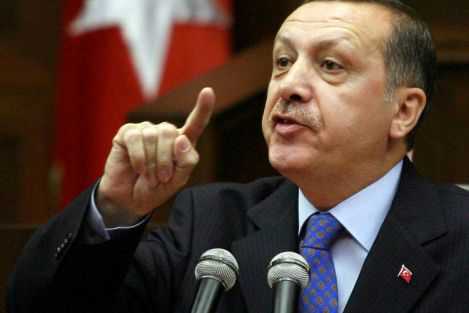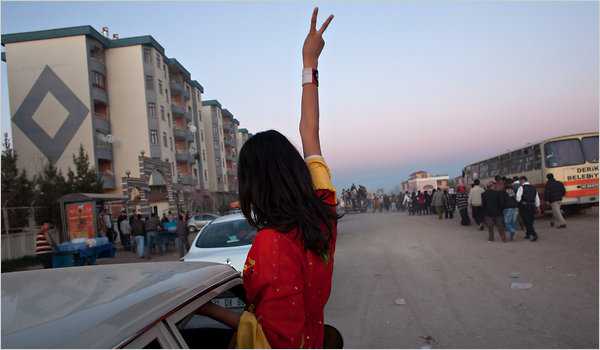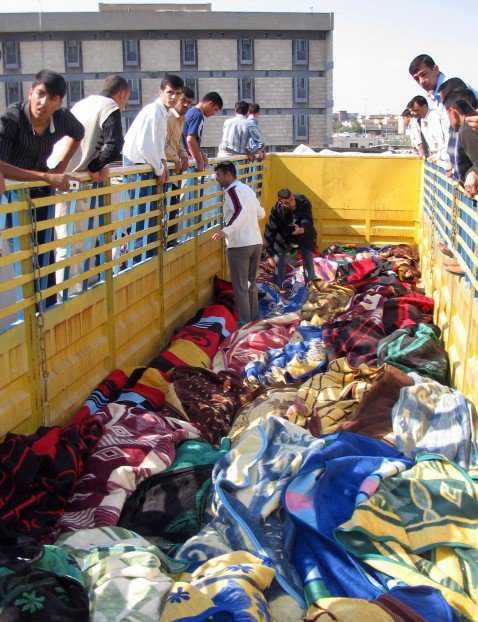Dorian Jones | Istanbul
Turkish Foreign Minister Ahmet Davutoglu, right, and his Iranian counterpart Ali Akbar Salehi leave after a news conference in Ankara, Turkey, October 21, 2011.
Photo: AP
Turkish Foreign Minister Ahmet Davutoglu, right, and his Iranian counterpart Ali Akbar Salehi leave after a news conference in Ankara, Turkey, October 21, 2011.
Iran’s foreign minister visited Turkey Friday as Turkish armed forces continue their military incursion against the Kurdish rebel group, the PKK, in northern Iraq, after the rebels killed 24 Turkish soldiers Wednesday. Ankara is looking for support from its neighbors, but regional tensions are complicating Turkey’s battle against the Kurdish militants.
Iranian Foreign Minister Ali Akbar Salehi’s visit to Ankara comes as Turkish armed forces continue their offensive against the PKK in neighboring northern Iraq. Turkish Foreign Minister Ahmet Davutoglu, in a press conference with his Iranian counterpart, said the two countries have agreed to collaborate in fighting the PKK and its Iranian wing, the Party of Free Life of Kurdistan, or PJAK.
He says Turkey and Iran declared their joint determination to combat the two groups. Davutoglu says from now on, the two countries will work together in a joint action plan until this terrorist threat is totally eliminated.
Iran also has a large Kurdish minority among whom are members of the PJAK. Despite both Turkey and Iran sharing a common threat, the Iranian foreign minister’s visit to Ankara is more about finding out what the Turkish government’s intentions are in its ongoing military incursion into northern Iraq.
According to Murat Bilhan, a former Turkish diplomat in Iran. “It shows that the Iranians are anxious about what exactly goes on there. And they would not like to be left in the cold, so they would like [to] see what they can do together with the Turks, or they cannot do,” said Bilhan.
Iran and Turkey are increasingly competing for influence in Iraq, a competition that is intensifying with the imminent withdrawal of U.S. forces. Bilateral tensions are already on the rise following Ankara’s decision to allow NATO anti-missile radar systems to be placed on Turkish territory, aimed primarily at Iran. But it is Turkish Prime Minister Recep Tayyip Erdogan’s robust support of the opposition in Syria – a key ally of Iran – that Tehran is most concerned about, according to political scientist Nuray Mert of Istanbul University.
“Turkey supports some sort of regime change. Iran takes it directly against itself. If there is going to be a regime change in Syria, the whole power balance will change. Because if Iran loses Syria, they will lose an important base of power in the Middle East. So it will be a major defeat for Iran,” he said.
Arab Spring and Turkish foreign policy
The Arab Spring has seen a major change in Turkish foreign policy, with Ankara dropping what it called its “zero problems with neighbors” strategy, to embracing the struggle for democracy. Iran was one of the main beneficiaries of the “zero problems” policy, developing close political and economic ties with Ankara despite Turkey’s Western allies, who are pushing for Tehran’s isolation over its controversial nuclear program. Sinan Ulgen, visiting scholar at Carnegie Europe, says difficulties now lie ahead for Turkish-Iranian relations.
“I think we can talk about a new phase,” said Ulgen. “So indeed we are entering a period of more realistic assessment. So obviously there are now increasing risks of heightened tension between Ankara and Tehran. There is inherent tension in the relationship of Turkey and Iran. It’s inherent because of the historical legacy because of the influence that these countries are trying to have in the region, which pits one against the other.”
But Turkey is one of the few countries prepared to ignore European Union and U.S. sanctions against Iran in connection with its nuclear program. Increasing trade and financial relations mean Ankara will continue to have powerful leverage over Tehran, according to Iran expert Jamsid Assadi of France’s Burgundy Business School.
“Iran is isolated, Iran needs much more Turkey than they need Iran, and Iranian press are going to criticize Turkey,” said Assadi. “However, they are going [to] accept whatever Turkey says. They don’t have any option.”
With Ankara increasingly flexing its diplomatic muscle across the volatile region, that leverage over Tehran, observers say, may prove crucial in any competition between these two regional powers.
via Turkey Looks to Iran for Support in Crackdown on Kurdish Rebels | Europe | English.

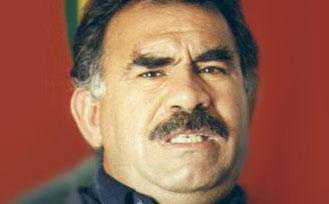
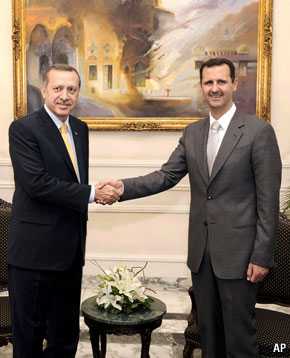
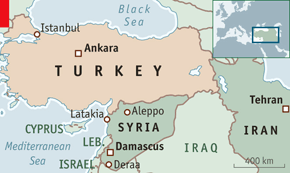 Rapprochement with Syria has also allowed Turkey to play a bigger regional role. The government came close to brokering a peace deal between Syria and Israel before the plan was scuppered by Israel’s attack on Gaza. Some Turks hoped that engagement with Syria would eventually yank Mr Assad out of the orbit of Iran, his biggest patron, and set him on a path towards reform. (His alleged involvement in the 2005 car-bomb assassination of Rafik Hariri, the Lebanese president, was quietly ignored.) All the more reason for Turkey’s feelings of betrayal.
Rapprochement with Syria has also allowed Turkey to play a bigger regional role. The government came close to brokering a peace deal between Syria and Israel before the plan was scuppered by Israel’s attack on Gaza. Some Turks hoped that engagement with Syria would eventually yank Mr Assad out of the orbit of Iran, his biggest patron, and set him on a path towards reform. (His alleged involvement in the 2005 car-bomb assassination of Rafik Hariri, the Lebanese president, was quietly ignored.) All the more reason for Turkey’s feelings of betrayal.